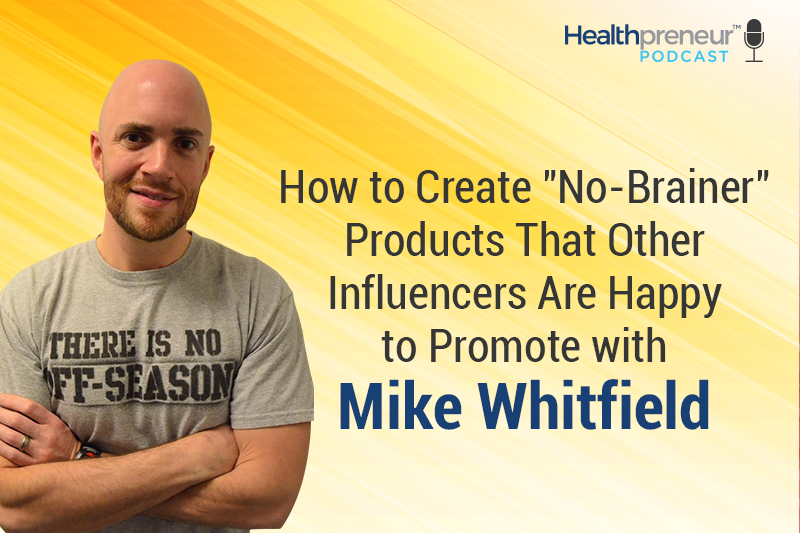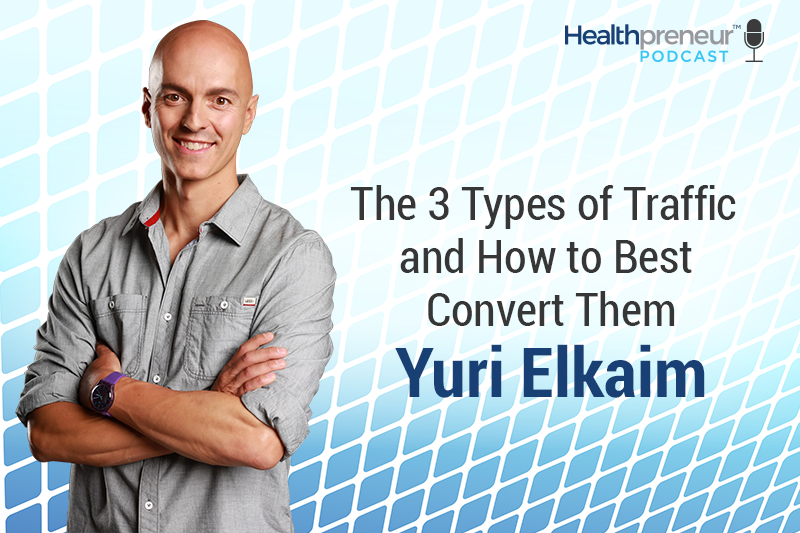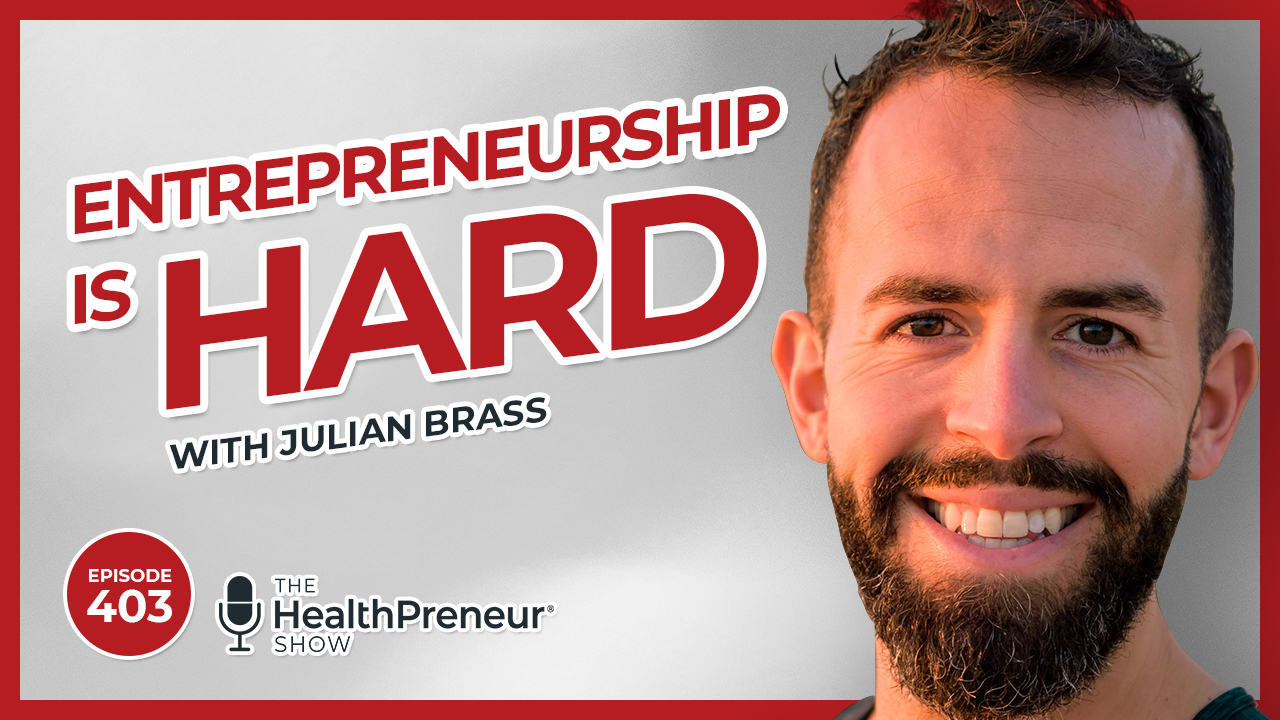9 Things Nobody Tells You About Being an Entrepreneur

In this episode, I’m going to discuss the nine things most people will never tell you about being an entrepreneur. For those of you who are already up and running—you’ll probably get a few good laughs and be able to relate to a lot of what I talk about here. And for those of you who are just starting out, this will give you some great insight as to what it’s actually like to be an entrepreneur.
In this episode I discuss:
2:00 – 4:00 1) There are no overnight successes
4:00 – 5:30 2) Sometimes, being an entrepreneur sucks
5:30 – 7:30 3) Entrepreneurship is in your DNA
7:30 – 9:00 4) Happiness is proportional to your ability to be comfortable with uncertainty
9:00 – 11:00 5) Being your own boss is the ultimate form of security
11:00 – 12:30 6) There’s not a lot of success at first
12:30 – 14:30 7) The best school is the school of hard knocks
14:30 – 17:00 8) It can get lonely sometimes
17:00 – 19:00 9) Entrepreneurs and small business drive the economy
Transcription
Welcome the Healthpreneur podcast guys. Yuri Elkaim here. Today is a solo round, a solo sermon as I sometimes refer to them.
Today we’re talking about nine things nobody tells you about being an entrepreneur. The audio you’re about to listen to has actually been extracted from one of my YouTube videos where I talk about this.
I thought I’d come in and formally introduce you to this topic and let you know that this is going to be an extraction from a previous video that I had recorded. Nonetheless, these are nine really really big points. If you want to write them down or if you relate to them (I’m sure you will) you’ll definitely appreciate this.
So without any further ado, let’s jump into these bad boys.
I want to share with you a couple of things, nine things specifically, that most people never tell you about being an entrepreneur. I want to kind of pull back the curtains and give you the no BS truth about what I’ve learned in the past eleven years online, running my own multiple seven figure online business, but also being an entrepreneur at the core of my being and my DNA.
If you were to do a chromosome test and get a DNA genetic code for me, you would find entrepreneur somewhere in that mixture.
1) There are no overnight successes
The first thing no one tells you—maybe you’ve heard this before, but I’m going to remind you—is that there are no overnight successes. All of the overnight successes that I know of took about five to ten years in the making.
The thing is, we live in a world that rewards the event, the outcome—and we forget about the process. We forget about the fact that a lot of these Hollywood actors were broke waiters working three different jobs while taking acting school and they couldn’t get a part for ten years.
Then finally, boom, they landed a part and it changed their life. Now we see them rolling out onto the red carpet and looking all glamorous. We forget about the journey.
And it’s even more pervasive in the entrepreneurial space. We see Richard Branson and Elon Musk and all these amazing entrepreneurs doing great things in the world, and unless you’ve read their autobiographies or books about them, we forget about the journey.
That leaves us with a very skewed idea of what success should look like, or what’s required to achieve that success.
So don’t get hung up on the Instagram images or the bells and whistles, the bling bling, because honestly, none of that stuff matters and it doesn’t happen overnight. It takes time, diligence and persistence. Got it?
2) Sometimes, being an entrepreneur sucks
The second thing is that being an entrepreneur sucks sometimes. There are days where, honestly, you just want to lay in bed. And when I say you, I really mean me.
Not every day, obviously. That would be called depression—which is obviously a topic for another day—but there are days when you just don’t want to get out of bed. Stuff is just not going your way and it’s always cloudy and raining on you for whatever reason.
Well, you know what? As an entrepreneur, there are days when you can stay in bed. And, if you have a team of people that rely on you, there are days that you can’t stay in bed. Understand that it’s not all peaches and roses.
And that’s why a lot of people are not willing to go down the path of entrepreneurship—because they don’t have what it takes to go through those dark times so that they can see the sun or the rainbow outside of that darkness.
But I can tell you—even though there are days when you just want to stay in bed and curl up under your blankets and hide from the world, it is well worth it. I would never trade any of those days, which are few and far between, with any of the stuff that I’ve been able to do with my business and the people that I’ve been able to serve.
It’s truly truly an amazing privilege to be an entrepreneur.
3) Happiness is proportional to your ability to be comfortable with uncertainty
The third thing no one tells you is that your happiness as an entrepreneur, I believe, is directly proportional to your ability to be comfortable with uncertainty.
I often talk about this with my wife. I would go crazy if I knew that I had a fixed income for the next x number of months or years, working in a job. If I knew exactly every month I was only making $5,000, I would slit my wrists. It would be insane.
I would much rather have the uncertainties, the ups and downs of business, of revenue higher some months than others and not knowing if I’m going to make as much as I did last month, or none at all—than having that predictable certain income where there’s no end in sight.
It’s like, “Okay, if I want to save for this house and go on this vacation, I have to save for this number of months based on what I’m earning,” blah blah blah.
As an entrepreneur, you want to take a trip somewhere? Guess what? You create value. You create a surge of income through some kind of promotion or some type of new, awesome thing that you put in the world—and you basically afford yourself that travel experience, that house, that car, whatever it is that you want.
And that’s an awesome, awesome thing. Because entrepreneurs are creators. You are a creator, and as a result of creating, guess what? You’ve created stuff that’s of value, hopefully, in this world … And simply as an exchange of value, people give you money.
That’s a beautiful thing, especially when you can see the future of a rising trend.
You’re like, “Listen, last year I made this amount of money (as a business or personally), and this year I think I have a really good sense that I can make more.”
That’s great, because you are in control. You are in the driver’s seat. You determine how much you make. You determine what you do.

You’re not building somebody else’s dream. You’re building your dream. That is an amazing position to be in.
4) Entrepreneurship is in your DNA
The other thing that I truly believe is that entrepreneurship is not something that’s teachable. Again, this is debatable and maybe you have a different opinion, but I don’t believe that people can go from being a nine-to-fiver and just being happy as an employee to being a full blown entrepreneur.
I really believe that as an entrepreneur, it’s built into your hard-wiring. It’s in your DNA and over time, you kind of start to unlock it.
Maybe from an early age you were stubborn and didn’t want to listen. But you were super creative and you had attention deficit disorder, you couldn’t sit still in class.
Instead of being medicated, let’s celebrate that, because that is an amazing trait, an amazing ability—to be able to be creative and think outside the box and not want to sit in a class for six hours a day and follow this rote way of learning.
If I look at my kids, I can sense at a very young age, it’s there. I’m not going to force it on them, but it’s there. I’m going to work with them, hopefully bring it out—and ultimately for them, whatever they want to do is all that matters.
But what I’m saying is, if you have that entrepreneurial DNA, it’s something that can be harvested over time. If you’re somebody who never wants to take risk and do your own thing, that’s not going to change. I really don’t believe it is. Anyway, that’s my opinion.
5) Being your own boss is the ultimate form of security
The ultimate form of security is being your own boss.
Now, this is hilarious. I think we live in a really twisted world sometimes, because let’s say you go to the bank to get a loan or a mortgage on a new property you want to buy. What the bank is going to look for is … first and foremost, they’re going to be like, “What is your employment? Do you have a steady job working for a good company? Put in your time? Clock in, clock out? Awesome.”
That, they actually favor, from a risk perspective, because they think that is more stable than you owning your company.
I’ve bought three properties in my live over the past ten years, and as a self-employed entrepreneur, I can tell you that you have to jump through some serious hoops to purchase a property, especially in Canada.
I’m happy that’s there, because we have a very good housing market in Canada, but at the same time it’s ridiculous.
Let’s say that you work for a company who has hundreds of thousands of employees, and guess what? I’m going to give you a little sneak peek behind closed doors. As the CEO of my own company, I have a team of 12 people.
At any moment, after shooting this video, I could fire any one of them if I wanted to. Now, I’m not going to do that because they’re amazing, but I could.
I don’t know about you, but does that sound like a very secure position, as the employee, to be in? No.
How many examples do we need to see of big companies laying off thousands of people, just shaving them off like dead skin. No thought. Done. So what do you do? You have a little severance package, a couple of months, maybe a year, and that’s it.
You go to the bank, and they expect that to be the ultimate secure job—It’s a fallacy.
The ultimate security is you. You are your best source of security.
Obviously there are times of uncertainty, but again, you control your life. You’re not in somebody else’s hands. You’re not like this puppet, and you have a puppeteer above you calling all the shots. Never forget that.
6) There’s not a lot of success at first
Number six is … There’s not a lot of success at first.
I use my example, which is not the typical example, but for the first three years of my business online, I struggled. I had zero success.
Now, I’m hoping that you’re a little bit smarter than I am so you’ve kind of seen some progress earlier on. The thing is, don’t expect overnight miracles. Your business was set up yesterday. You have no website. You have no products. You have no content. All of a sudden you think you’re going to be making money? Not going to happen.
That’s why I do what I do. I want to show you the path of least resistance to better results in a quicker amount of time. That’s why I have Healthpreneur and I’m helping all sorts of amazing health and fitness professionals take their online business, or take their ideas, and turn it into an amazing business that helps so many more people.
Again, it’s not about “I have an idea, product, I’m going to make tons of money.” It doesn’t happen like that. There’s a process involved.
You have to be realistic with that.
It’s very similar to you training a client—if you’re a personal trainer, for instance, and your client has never worked out before in their life. Guess what? Are they going to have some soreness initially? Absolutely.
If you don’t let them know about that ahead of time, I think you’re kind of giving them a bit of a disservice. If you say, “Listen, Jane, you haven’t worked out before. You’re a little bit overweight. We’re going to do some basic stuff today, and I want to let you know you’ll probably feel a little soreness for the first few workouts. Cool?” That’s just part of the process.
If you tell them, “Listen, you’re not going to feel any soreness. You’re going to feel awesome right from day one,” you’re kind of lying to them. And that’s not cool.
That’s why I think it’s really about having these expectations, and realistic expectations about what to expect in your business. It’s not all peaches and roses as I’ve said before.
7) The best school is the school of hard knocks
The seventh thing that nobody tells you about being an entrepreneur is that the best school is the school of hard knocks. I had a friend of mine who’s a close friend I’ve known for 20 some odd years. He was at the end of finishing his schooling. He did his CA. He did all that stuff.
Then he had this sum of money. He was like, “What should I do? Should I start a business or do my MBA?” Based on his upbringing and the culture he’s from, obviously schooling was very important, so he invested all that money, which was about $100,000, into doing his MBA.
Now I have a conversation with him. Is he happy doing what he’s doing? Not really. He’s doing data entry, for lack of a better term. He’s doing some other stuff. Nowadays MBAs, PhDs—it’s overrated, guys. It’s overrated.
The best opportunity you have to learn is by actually setting up your business and learning on the fly.

Make the mistakes. Blow some money on something that you thought was going to work. That’s how you’re going to learn.
You’re not going to learn from a textbook or some theory in class about Business 101 or entrepreneurship—“Here’s how to set up your own shop.” It’s all nonsense.
My wife started a jewelry business on Etsy and she’s done amazingly well. And it’s been an amazing learning curve for her. She has learned everything she’s had to do, from packaging and shipping, to making the bracelets, to advertising.
All this stuff, she’s learned in a year because she had to. She’s been forced to. She’s been thrown out into the ocean and the ocean says, “Listen. You can sink or you can swim.” That’s just the way it goes in the world. That’s just the way it goes as an entrepreneur. Again, it’s a great position to be in.
8) It can get lonely sometimes
That leads me to number eight, which is the flip side of that—as an entrepreneur, it can be very lonely sometimes. If you’re an entrepreneur and you’re kind of doing what I was doing for the first few years of my business … Where I was just sitting behind the computer trying to figure things out, it’s a very lonely space.
That’s why I committed to going to live events, to joining a Mastermind group, to actually connecting with people—because it’s amazing when you can connect with other people over an uncommon commonality.
You and I have an uncommon commonality, which is we are uncommon entrepreneurs in the health, fitness and wellness space. Not everyone is like that, right?
There are entrepreneurs in all sorts of different fields, but we are specializing in the health and wellness space. That’s an uncommon commonality.
So when you can connect with people like you, you feel like you’re part of a tribe. There’s a bigger meaning. Now you can connect with others who get you.
I’m sure you’ve had this at some point—especially if you have an online business—where even your family is like, “Yuri, what is it exactly that you do?”
I don’t know about you, but that’s like the worst possible question to answer. How do you even answer that to somebody who doesn’t even speak the same language as you? It’s like you’re speaking Japanese and they’re speaking Arabic.
I don’t even know how to explain what I do to the average person. Even to my family members. In fact they thought that they kind of understood what I did after they saw me on Dr. Oz. They were like, “Oh my God. Did you see Yuri? He’s so successful! He’s on Dr. Oz!”
None of that stuff matters. But to the average person who doesn’t understand what it’s like to be an entrepreneur, a lot of that superficial stuff—the bells and whistles and the bling bling—they really think that you’re doing well.
What I’m saying is that when you can surround yourself with other people in your space who are also entrepreneurs, who are also helping others, who get what this whole online game is all about. Who understand what an opt-in page is, what an email list is.
I was audited by the CRA, Canadian Revenue Agency, a couple of years ago because they didn’t understand how our business operated. It took me weeks to explain and show all the statements. “This is how this works. Do you know this thing called Amazon? You ever buy a book on Amazon? It’s kind of like that but it’s not the same.”

So the world is slowly catching up to what we do, but they’re still far behind. You want to be surrounding yourself with people who get it, and who can support you at a personal level—because again, it can be lonely—but also at a professional level where they can help you in your business and so forth.
Being lonely sucks. It’s one of the leading causes of unhappiness and early death among seniors who lose their spouses, for instance. You want to really be surrounded with others who can support you in your journey, and you can support them as well.
9) Entrepreneurs and small business drive the economy
The ninth and final thing that most people don’t tell you about being an entrepreneur, is that entrepreneurs and small business drive the economy.
That’s it. It’s the base of the economic system. It’s not coming from the big Fortune 500 companies.
Because, think about this—all those big Fortune 500 companies were initially a small business. They were initially started by somebody who had a vision or a small team of people who wanted to accomplish a similar goal.
Over time—decades, hundreds of years—they built up and grew into these prominent companies. That’s awesome. Good for them.
But understand this. Everything starts with one individual who has an idea. And that’s amazing.
Think about this—the camera that I’m shooting on, this room that I’m in, the computer that you’re watching this from or the smartphone that you’re on … What was that?
That was an idea.
An intangible, untouchable thing that somebody had in their head and said, “You know what? Let’s make this happen.”
And guess what, guys? Entrepreneurs are the only people who do that stuff.
The employees, the workers, the people actually doing it—they’re valuable, extremely valuable. But nothing happens without that initial idea or vision that comes solely from the risk taker, from the visionary, and from the person who sees a better future for him and for his fellow humans.
And that’s why I love being an entrepreneur. I hope you do as well.
***********************************************************
If you’ve enjoyed this, share it with your friends who are also health and fitness entrepreneurs. Be sure to subscribe to the channel for more awesome videos to help you take your health or fitness expertise into a thriving online business.
Remember to join us over at the website healthpreneurgroup.com, where I’m sharing awesome resources and tools to help you accomplish these very goals. Until our next video, have an awesome one. Go out and change some lives. I’ll see you then.
Could you relate to any of those? I bet there were a couple in there that were like, “Yeah. This is definitely me. I can relate to this.”
If so, that’s awesome. Once again, if you’ve enjoyed this episode, remember to subscribe to the Healthpreneur podcast on iTunes. We have three amazing episodes coming your way every single week.
Mondays are my solo sessions where I’m with you one-on-one. Wednesdays and Fridays, I’m bringing you some amazing guests to help you stay inspired and motivated to keep on keeping on, even when the going gets tough, because the world needs to hear your voice.
The world needs your message. They need to hear your story because what you are doing makes a difference in people’s lives.
I really believe that what you have to offer is unique. It doesn’t matter if other people do something similar, you have a unique perspective. You have a story that other people are going to connect with. Never forget that.
Introspect. Don’t compare. Focus on your lane. Do you and keep on going on.
If you enjoyed this episode, head on over to iTunes and subscribe to Healthpreneur™ Podcast if you haven’t done so already.
While you’re there, leave a rating and review. It really helps us out to reach more people because that is what we’re here to do.
What You Missed
So many entrepreneurs are sold the myth that in order to be successful, they need to hustle and grind and that putting in 20 hours a day is a badge of honor.
With this type of ideology, there are many entrepreneurs who are afraid to take time off from their business.
Which is why I want you need to check out my interview with Jennifer Fugo.
If you don’t know who Jennifer is, she is a functional nutritionist and CEO of The Gluten Free School.
In this episode, Jennifer and I discuss the importance of taking time off as an entrepreneur, traveling and eating gluten-free in Italy.
This was a big step for her because like so many entrepreneurs, she was initially afraid of taking time off from her business.
Jennifer also shared an interesting story of a challenge she faced, how she dealt with it and how she learned to move forward rather than becoming paralyzed by it.
I can’t think of a better way to end the week than with this interview Jennifer Fugo.
By the way, you’ll want to hear how Jennifer ate her way around Italy gluten-free.
Related posts
March 21, 2018
How to Create “No-Brainer” Products That Other Influencers Are Happy to Promote with Mike Whitfield
Welcome episode 73 of the…
January 18, 2021
They Left Cushy Legal Careers To Be Healthpreneurs with Chris Lewarne and Karina V
Like so many of us, Chris and…
December 18, 2017
The 3 Types of Traffic and How to Best Convert Them
It’s time for another solo round…
April 9, 2021
Anxiety, Self Awareness, and Entrepreneurship with Julian Brass
Julian Brass, a speaker,…





